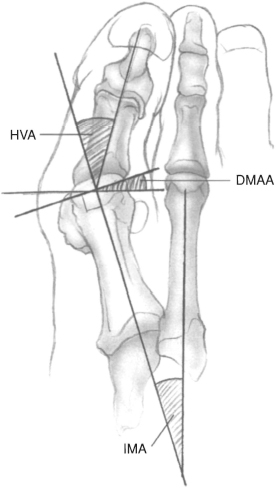CHAPTER 38 Armen S. Kelikian 1. Hallux valgus: metatarsus primus varus represents a complex of deformities and deficiencies that require relative versatility and adaptability in treatment. 1. Painful hallux 2. Intermetatarsal angle (IMA) <15 degrees (Fig. 38–1) 3. Distal metatarsal articular angle (DMAA) >10 degrees (bidirectional chevron) (Fig. 38–1) 1. Hypermobility of the first tarso-metatarsal joint 2. Revision (relative) 3. Arthritis of the metatarsophalangeal (MTP) 4. Peripheral vascular disease 5. Narcissism 1. Hallux valgus foot scores <70 2. Anteroposterior (AP) weight-bearing X-rays of the forefoot 3. Harris floor reaction imprints 1. Ankle block and ankle tourniquet (250 mm) 2. Patient positioned supine on standard operating room table 3. Microsagittal saw (medium blades) 4. 0.062- and 0.054-in K-wires with wire driver 5. Tenotomy scissors 6. Banana #67 Beaver blade 7. Ragnell, Davis, and Hohman retractors 1. The Ragnell retractor is used to pull the proximal fragment medially to allow lateral translation of the capital or distal fragments. 2. An intra-articular adductor tenotomy is performed from medial to lateral using a banana blade. 1. Avoid excessive lateral stripping of head/neck fragments. 2. Avoid crossing the osteotomy ends. 3. Avoid notching the first metatarsal cortex during the exostectomy.
Bunions and Hallux Valgus
Definition
Indications (Chevron Osteotomy)
Contraindications
Preoperative Preparation
Special Instruments, Position, and Anesthesia
Tips and Pearls
What To Avoid

![]()
Stay updated, free articles. Join our Telegram channel

Full access? Get Clinical Tree








